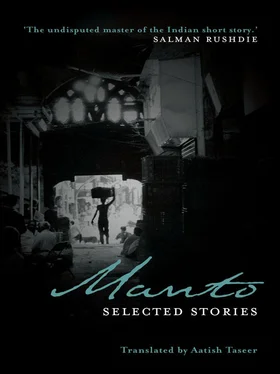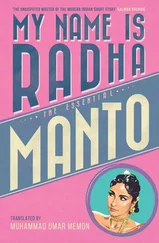It is hard not to come to feel a great affection for this narrator. He is mischievous, compassionate, funny, a listener, a drinker, sceptical and without prejudice. His Bombay is a city of motor cars and bicycles, of chawls and mansions, of hookers and heiresses, of Sikhs and Parsis, of depressives and lunatics, and he asserts his nativity by moving freely between its varied lives, making it seem like no less his right than sitting on a bench at Apollo Bandar, watching boats and people go by. At one point in her essay, ‘My Friend, My Enemy’, Manto’s great friend, Ismat Chughtai, questions a description Manto gives to her of a friend of his.
That he could be a rascal and at the same time an extremely honest and honourable man, how could that be? I didn’t even try to understand. This was Manto’s territory. From the jilted squalor and refuse of life, he picks out pearls. He enjoys digging in the refuse because he doesn’t trust the luminaries of the world; he doesn’t trust their brilliance or their judgement. He catches the thieves that lie in the hearts of their pure and respectable wives. And he compares them to the purity in the heart of a whore in a brothel.
As much as one would like to separate Manto, the writer, from Manto, the man, it is not always easy to do so. There is the added confusion of how much Manto’s main narrator seems to resemble both writer and man. All of this makes it harder to bear that ugly truth about Manto, the man: that for all his love of Indian multiplicity, he went to Pakistan. He even tried convincing Chughtai to go. ‘The future looks beautiful in Pakistan,’ he said to her, ‘We’ll be able to get the houses of people who’ve fled from there. It’ll be just us there. We’ll progress very quickly.’ When I read this, I had trouble holding the two Mantos in my mind. It seemed impossible that the creator of Manto, the narrator and fictional presence, so immersed in the variety of India, seeming so much to rejoice in it, should also be the author of that remark, with its sly wish for homogeneity, for the place where ‘It’ll be just us.’ Chughtai, for other reasons, was also disgusted. The two had an intensely close friendship. He spoke movingly to her about the son he’d lost, giving details about bathing him, and how he would pick up things from the floor and put them in his mouth, details which seem to have fed directly into ‘Khaled Mian’. Manto and Chughtai argued and fought and laughed about everything from love and relationships to language and literature, but never seriously, except over Pakistan. ‘I’d had so many fights and arguments with him,’ she wrote, ‘but never over a serious matter of principle. In that moment, I realised what a coward Manto was. He was ready to save his life at any cost. To make his future, he was ready to get his hands on the life earnings of people who were fleeing. And I began to feel a hatred for him.’
Manto did not just regret his decision to go to Pakistan; it destroyed him. In his stunning essay on the 1949 ‘Cold Flesh’ trial (in which, it must be said, my grandfather, though he said little to damn him, appeared on the side of the prosecution) in Lahore, he pointedly answers Chughtai’s charge of taking part in the property grab and denies ever having done so. He also seems very early to anticipate the larger cultural questions the Partition would bring up for both Pakistan and India. He wrote of his arrival in Lahore:
Try as I did, I wasn’t able to separate Pakistan from India and India from Pakistan. Again and again, troubling questions rang in my mind: Will Pakistan’s literature be separate from that of India’s? If so, how? Who owns all that was written in undivided India? Will that be partitioned too? Are India’s and Pakistan’s core problems not the same? Will Urdu be totally wiped out in India? What shape will it take here in Pakistan? Will our state be a religious one? We’ll defend the state at all cost, but does that mean we won’t have permission to criticise its government? As an independent country, will our condition be different from what it was under the British?
In Pakistan, Manto was tried twice for obscenity. He and Chughtai had faced obscenity trials before Independence as well, but there is a marked difference in the tone of his descriptions of the pre-Partition trials versus those in Pakistan. There is a lightness about the earlier trials: he travels up to Lahore with Chughtai; they buy slippers along the way; and at the 1941 trial of ‘Smoke’, he seems to be having a positively good time, lecturing the court on Maupassant. But in Pakistan, the trials were longer, more exacting, and the outcome, more disturbing; there were arrests, searches and the risk of jail time with hard labour. In January 1952, in between trials, Manto wrote,
My mind was in a strange state. I couldn’t understand what I should do. Whether I should stop writing or carry on totally regardless of this scrutiny. Truth be told, it had left such a bad taste that I almost wished some place would be allotted to me where I could sit in one corner, away for some years from pens and ink wells; should thoughts arise in my mind, I would hang them at the gallows; and should an allotment not be possible, I could begin work as a black marketeer or start distilling illicit alcohol…
It was the latter that finally claimed Manto. His last years were beset with financial troubles; he drank heavily; he wrote to Chughtai on more than one occasion, pleading with her to find a way for him to come back to India. She was surprised to learn that far from large protests and signed declarations on his behalf, many in Pakistan felt he deserved to be punished. He died on January 18, 1955 in Lahore at the age of forty two.
In death, Manto paid a greater price for his migration than he had when he was alive. He was forgotten in the country he wrote most about. He became part of a number of artists, musicians and writers whom India disowned — sometimes by singling them out, sometimes as part of a larger disowning of Urdu — for their migration. It might appear strange to someone reading this collection why I, with my mixed Indian and Pakistani heritage, have included so few of Manto’s famous Partition stories in this collection. The reason is that I found, with their simple symmetries, drenched in that bittersweet irony of how one people could have ended up as two nations, they were the only stories of Manto’s two hundred and fifty that today, feel dated. But it is also for this reason, because so little has ended up as symmetrical in the fortunes of India and Pakistan, that India must now reclaim men like Manto. In Pakistan, Manto’s world, crowded with Hindus, Sikhs and Muslims, would feel very foreign. It is only in India, still plural, not symmetrically Hindu, that it continues to have relevance. His eye could only have been an Indian eye, sensitive to surprising detail, compulsively aware of Indian plurality, sympathetic to people trapped in their circumstances, here pointing to a particular Hindu festival, there imitating Bombay street dialect.
Writers rarely set out to be national writers. They need small, intimate worlds, full of details; the macro scale of countries, especially those as wide and various as India, cannot be their direct material. Cities, neighbourhoods, sometimes a single street, provide the gritty detail in which a larger architecture can become visible. For Manto, this city, as Dublin was for Joyce and Chicago for Bellow, was Bombay. He was not an Indian or Pakistani writer as much as he was a Bombay writer, and more than India, the city of Bombay must reclaim Manto.
Khalid Hasan, Manto’s Pakistani translator, has done what he can to make Manto available in English, and though exhaustive, his translations not only lack the simplicity, speed and vitality of Manto’s prose, they are guilty of the greatest crime any translator can commit, the crime of trying to improve upon the writer. This well meaning journalist paraphrases Manto; he deletes entire paragraphs in ‘For Freedom’; and rearranges chunks of text in ‘Blouse’, even deciding to change the colour of the blouse from purple or violet to ‘azure’. The result is that his translations are not really close translations at all; they are synopses.
Читать дальше












